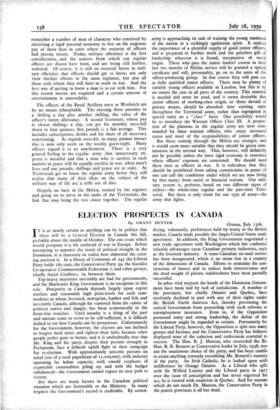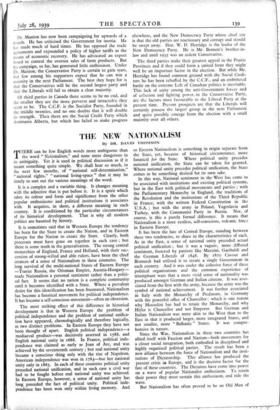ELECTION PROSPECTS IN CANADA
B GR A.NT DEXTER
IT is as nearly certain as anything can be in politics that there will be a General Election in Canada this fall, probably about the middle of October. The one event which would postpone it is the outbreak of war in Europe. Before attempting to appraise the trend of political thought in the Dominion, it is necessary to realise how abnormal the exist- ing position is. In a House of Commons of 245 the Liberal Party holds 180 seats, the Conservative Party 39, the Socialist Co-operative Commonwealth Federation 7, and other groups, chiefly Social Creditors, 19 between them.
Top-heavy majorities inevitably are bad for governments, and the Mackenzie King Government is no exception to this rule. Prosperity in Canada depends largely upon export markets and reasonably high price-levels for such com- modities as wheat, livestock, newsprint, lumber and fish, and inevitably Canada, although far removed from the centre of political unrest and danger, has been economically in the front-line trenches. Until autarky is a thing of the past and nations cease to strive to be self-sufficient, it is difficult indeed to see how Canada can be prosperous. Unfortunately for the Government, however, the electors are not inclined to forgive hard times and tighten their belts because other people prefer guns to butter, and it is undoubtedly true that Mr. King and his party, despite their present strength in Parliament, face a difficult uphill fight in their campaign for re-election. With approximately 900,000 persons on relief (out of a total population of it,zoo,000), with industry operating far below capacity, with unsold surpluses of exportable commodities piling up, and with the budget unbalanced—the Government cannot expect an easy path to victory.
But there are many factors in the Canadian political situation which are favourable to the Ministry. In many respects the Government's record is creditable. By surren- Ottawa, Ply 131h. dering, voluntarily, preferences held by treaty in the British market, Canada made possible the Anglo-United States trade agreement. In addition, the King Government negotiated a new trade agreement with Washington which has conferred valuable advantages upon Canadian primary industries, such as the livestock industry. A trans-Canadian air-mail service has been inaugurated, which is no mean feat in a country of the dimensions of Canada. Efforts to stimulate the con- struction of houses and to reduce both interest-rates and the dead weight of private indebtedness have been partially successful.
In other vital respects the hands of the Dominion Govern- ment have been tied by lack of jurisdiction. A number of the provinces, but chiefly Ontario and Quebec, have resolutely declined to part with any of their rights under the British North America Act, thereby preventing the central Government from proceeding with such reforms as unemployment insurance. Even so, if the Opposition possessed unity and strong leadership, the defeat of the Government might be regarded as certain. Fortunately for the Liberal Party, however, the Opposition is split into many groups and factions, and the Conservative Party has hitherto displayed none of the cohesion and enthusiasm essential to success. The Hon. R. J. Manion, who succeeded the Rt. Hon. R. B. Bennett as Conservative leader in July, 1938, was not the unanimous choice of the party, and has been unable to attain anything remotely resembling Mr. Besmett's mastery of the party. An Irish Catholic, he is looked upon with indifference by Orange Ontario. As a Liberal who split with Sir Wilfrid Laurier and the Liberal party in 1917 over the issue of conscription and has never regretted his act, he is viewed with suspicion in Quebec. And for reasons which do not touch Dr. Manion, the Conservative Party in the prairie provinces is all but dead. Dr. Manion has now been campaigning for upwards of a month. He has criticised the Government for inertia. He has made much of hard times. He has opposed the trade agreements and expounded a policy of higher tariffs as the means of economic recovery. He has advocated an export board to control the oversea sales of farm products. But his campaign, so far, has generated little enthusiasm. Under Dr. Manion, the Conservative Party is certain to gain seats, but few among his supporters expect that he can win a majority in the next Parliament. The best they hope for is that the Conservatives will be the second largest party and that the Liberals will fail to obtain a clear majority.
Of third parties in Canada there seems to be no end, and the smaller they are the more perverse and intractabl.e they seem to be. The C.C.F. is the Socialist Party, founded in the middle twenties, and no one doubts that it will double its strength. Then there are the Social Credit Party which dominates Alberta, but which has failed to make progress elsewhere, and the New Democracy Party whose chief cry is that the old parties are reactionary and corrupt and should be swept away. Hon. W. D. Herridge is the leader of the New Democracy Party. He is Mr. Bennett's brother-in- law and until 1935 was an ardent Conservative.
The third parties make their greatest appeal in the Prairie Provinces and if they could form a united front they might well be an important factor in the election. But while Mr. Herridge has found common ground with the Social Credi- tors he has been rebuffed by the C.C.F., and an embittered battle on the extreme Left of Canadian politics is inevitable. This lack of unity among the anti-Government forces and of cohesion and fighting power. in the Conservative Party, are the factors most favourable to the Liberal Party at the present time. Present prospects are that the Liberals will certainly possess the largest group in the next Parliament and quite possibly emerge from the election with a small majority over all others.









































 Previous page
Previous page